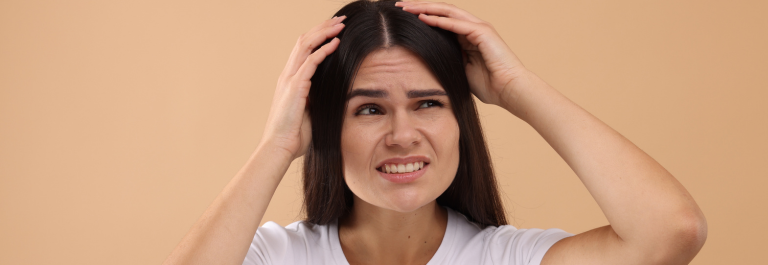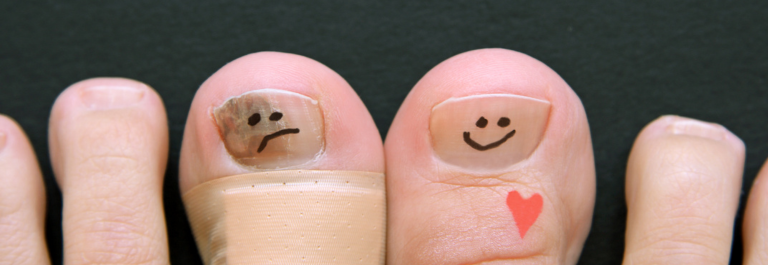An itchy scalp is more than just a nuisance: it can be a sign of underlying issues that can lead to hair loss. That’s why understanding the connection between an itchy scalp and hair loss is key to treatment and prevention.
In this post, we'll cover:
-
What causes itchy scalp and hair loss
-
How to treat for hair regrowth
-
How to prevent a healthy scalp and hair
Read on to find out how to manage an itchy scalp, what it does to hair growth, and what you can do to improve your scalp health.
Common Causes of Itchy Scalp and Hair Loss
Scalp Psoriasis
This inflammatory skin condition causes patches of red, scaly skin on the scalp which can cause intense itching and temporary hair loss. People with psoriasis on other parts of their body often develop scalp psoriasis, resulting in an inflamed scalp and dry scales. If not properly treated, scalp psoriasis can lead to potential hair loss from excessive scratching or picking at the affected areas.
Seborrheic Dermatitis
A common condition that causes itchy skin and scaly patches, seborrheic dermatitis can cause excessive hair shedding. The irritation and inflammation can weaken hair follicles and affect the hair growth cycle, leading to more hair loss.
Fungal Infections
Scalp ringworm (tinea capitis) and other fungal infections can cause itchy bumps and scalp itch. These infections damage the hair shaft and follicles, causing patchy baldness. Treating these infections with antifungal medication is key to getting your scalp healthy.
Alopecia Areata
This is an autoimmune condition where the immune system attacks the hair follicles, causing hair thinning and bald spots. As the condition can be accompanied by scalp itchiness, you should consult a doctor for diagnosis and treatment.
Allergic Reactions
Some people experience scalp itchiness and hair loss due to allergic reactions to hair dyes or styling products. These reactions can cause inflammation and can weaken the hair follicles, resulting in hair breakage.
How to Treat Hair Loss and Improve Scalp Health
Here are some treatment options to enhance your hair and scalp health:
Limit Chemical Exposure
Minimize the use of harsh hair products and dyes that can cause irritation and allergic reactions. When using new products, always perform a patch test to check for sensitivity.
Moisturize Your Scalp
A dry scalp can make itchiness worse. This Nourish + Hydrate Manuka Balm is designed for those with scalp psoriasis and other skin conditions that need gentle care. With only 6 natural ingredients, it’s perfect for sensitive scalp skin.
Practice Good Hygiene
Washing with a gentle soap regularly can remove excess oil and buildup, keeping the scalp clean and reducing the risk of fungal infection. Our Coconut and Sunflower Oil Bar cleans the scalp without stripping its natural oils. Coconut oil is anti-inflammatory, making it particularly great for scalp psoriasis. Plus this soap is suitable for all skin types - even sensitive skin!
If you’re looking to step up your hair care routine in a simple, sustainable way, Zero Waste Store's Shampoo Bar is a game-changer. It’s gentle enough for daily use but powerful enough to wash away dirt, oil, and product buildup. Made with all-natural, vegan ingredients and infused with nourishing botanicals, it helps bring life back to hair that’s feeling dull, dry, or over-processed from coloring. The best part? It leaves your hair soft, shiny, and healthy, without the plastic bottle.
A Healthy Diet
Maintaining a healthy diet rich in vitamins and minerals can support hair growth and strengthen existing hair. For example, foods high in omega-3 fatty acids, such as salmon and walnuts, can also enhance scalp health by improving blood flow and nourishing hair follicles.
Manage Stress
Managing stress through relaxation techniques, like meditation, can also improve scalp and hair health.
Avoid Tight Hairstyles
Styles that pull on the hair can lead to traction alopecia, causing permanent hair loss. Opt for loose styles that minimize tension on the hair and scalp.
Find Relief from Itchy Scalp and Hair Loss
Dealing with itchy scalp and hair loss is frustrating but knowing the causes and treatment options can help you get relief. By taking proactive measures and getting the right treatment, you can keep your scalp healthy and reduce hair loss.












